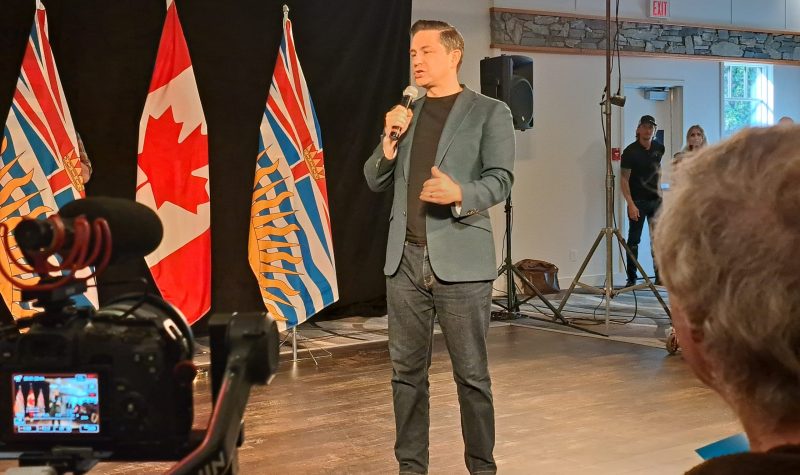With just about two years to go before Canadians could see the next federal election, political tensions in across the country and even in Northwest B.C. seem to be at an all time high.
Look no further than just last week when both leaders of the federal Conservative Party and the federal NDP toured the riding of Skeena-Bulkley Valley, already jockeying for votes in what could be a hotly contested region next election.
The riding of Skeena-Bulkley Valley was created from a larger riding in 2004. From 1993 to 2004 this rinding, which included farther areas east of the Valley closer to Prince George, saw 10 years of conservative representation. But during the late 50’s to early 90’s Northwest B.C. was a stronghold for New Democrats, and before that the CCF, the Co-operative Commonwealth Federation. Since 2004 that support only seems to have strengthened over time.
“People in the Northwest remember how ten years of Poilievre and the Harper government harmed our region,” said Bachrach. “Right now, times are tough for a lot of folks, especially working people. Tough times call for workable solutions that bring people together, not the kind of extreme politics we’ve seen from his party.”
But in recent years, and especially since the COVID-19 Pandemic, Northwest B.C. has seen a growing interest in conservative politics. Historically speaking, the conservative vote in the Skeena-Bulkley Valley is consistently between 10 to 13, 000 votes, give-or-take, during federal elections. However, the NDP vote has fluctuated greatly over the past 20 years.
Since 2004 the NDP vote in the Skeena-Bulkley Valley has fluctuated between 13,000 and 22,000. But last time around, in 2021, the rematch between conservative candidate Claire Rattee and current Member of Parliament, Taylor Bachrach, saw the conservatives make gains, but just not enough to beat the NDP. In contrast, the NDP's support in Skeena-Bulkley Valley has dropped by 9 percent since 2015, winning by about 2,400 votes in 2021. During that same time period the conservative vote has grown by more than 12 percent.
Perhaps this is what Pierre Poilievre, the leader of the conservatives, and Jagmeet Singh, the leader of the NDP felt the need to visit and rally the troops. Although no conservative candidate has been named for the possible 2025 federal elections, if not easier, Polleve was still getting the large crowd and the Hudson Bay Lodge fired up over the high costs of fuel, taxes and groceries, blaming much of the mounting costs on Prime Minister Justin Trudeau and the governing Liberals.
“My common sense plan: cap spending and find ways so we can balance the budget and bring down inflation and interest rates," Poilievre told the packed room at the Hudson Bay Lodge. "I’ll bring in a law called, a for-dollar-for-dollar law, it requires that every minister who brings forward a new spending idea will have to find an equal amount of savings in his department to pay for, no, we’ll run the finances the way you run your household.”
Listen to the full episode below.


